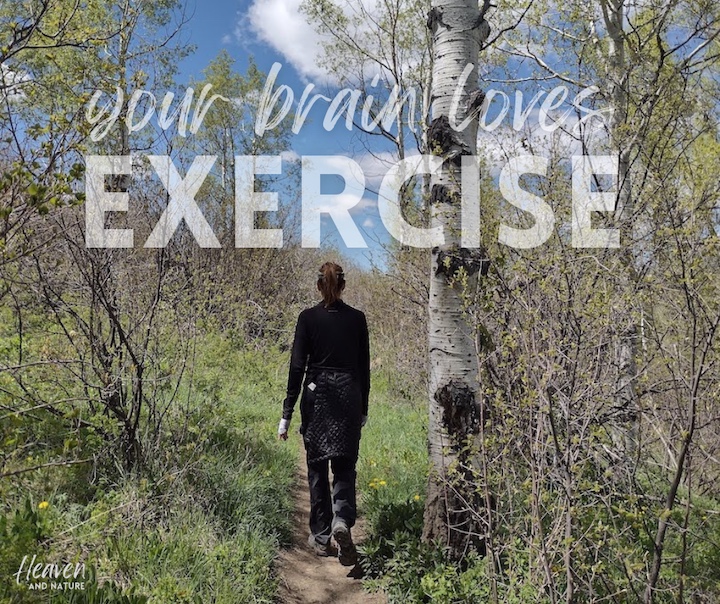While regular exercise is great for all your body’s systems, let’s focus here on why your brain loves exercise.

Dr. Caroline Leaf is a neuroscientist from South Africa. She wrote an article called “Your Brain Loves Exercise” that I want to pull from.
(Dr. Leaf has some fascinating material that shows how our thought life directly affects the health of the neurons and other cells in our brain. It’s worth looking into! She’s a Christian, so she ties in scientific and medical evidence with Scripture.)
Exercise Improves Cognitive Function
In her book, Think & Eat Yourself Smart, Dr. Leaf says:
“Exercise potentially improves all areas of cognitive function, including thinking, learning, and memory, especially with age. In children, exercise is incredibly important for memory development.”

Here’s what happens in our brains when we exercise, especially aerobically (raising our heart rate, breathing hard):
- Increases blood flow to the anterior cingulate cortex (the middle of our brain). That helps us shift thoughts from one to another.
- Forms memories and ties those memories together
- Increases blood flow to the hippocampus, improving memory and thinking.
Exercise Improves Executive Function
These benefits become more and more important as we age, because many aging folks get less and less active. This academic paper ties regular exercise to healthy executive functioning. What does that mean?
“Executive functions are strategic in nature and depend on higher-order cognitive processes that underpin planning, sustained attention, selective attention, resistance to interference, volitional inhibition (i.e., automatically stopping ourselves from walking in the street if a car is coming at us), working memory and mental flexibility.”

If regular exercise helps our brain’s executive functioning, that’s a very good thing! Especially as we get older.
Exercise Helps Both Directly and Indirectly
A Harvard Health Publishing article says:
“Exercise helps memory and thinking through both direct and indirect means. The benefits of exercise come directly from its ability to reduce insulin resistance, reduce inflammation, and stimulate the release of growth factors—chemicals in the brain that affect the health of brain cells, the growth of new blood vessels in the brain, and even the abundance and survival of new brain cells.
“Indirectly, exercise improves mood and sleep, and reduces stress and anxiety. Problems in these areas frequently cause or contribute to cognitive impairment.” (source)
“Exercise helps memory and thinking through both direct and indirect means.“

Exercise Helps Lessen the Impact of Stress
The video below (from BYU College of Life Sciences) shows three important benefits exercise has on our brain function:
First, as we covered earlier, it improves blood flow to the brain. Not only does that blood bring important nutrients to the cells, it “increases production molecules” the brain relies on to thrive.
Next, as covered, exercise helps improve the brain’s ability “to absorb information and form long-term memories.”
Third, exercise decreases “the number of stress receptors in the hippocampus. Reducing stress receptors minimizes the effect of stress hormones on the brain, decreasing the impact of stressful experiences.”
“Do I Want a Healthy Brain?”
You can ask yourself that question the next time you’re tempted to skip your next workout, walk or bike ride. Or when you’re trying to decide whether to begin an exercise program.
One great way to keep your brain as healthy as you can is simply by maintaining a lifestyle of physical activity. It’s one of those things only you can do for yourself.
Sometimes we focus so much on just one aspect of being physically active—like losing weight. If we don’t experience success or don’t need to lose weight, it all goes out the window.

There are many other reasons to stay active, including for your brain—your body’s command center.
Here’s more…
- Why Strength is Key to Optimal Health
- Shalom: Its Meaning and Promise
- Hearing God in Our Outdoor Adventures
- Water and Its Importance in the Bible - August 27, 2024
- How God Speaks through Signs in the Heavens - June 14, 2024
- 20 Meaningful Bible Verses about Nature - March 18, 2024

